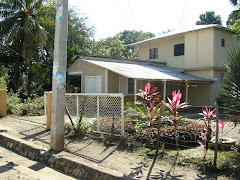 Since starting work, I have felt much more submerged in the Dutch language. All of the quirks of learning a language by submersion and contact - as opposed to classroom study - are beginning to come back to me.
Since starting work, I have felt much more submerged in the Dutch language. All of the quirks of learning a language by submersion and contact - as opposed to classroom study - are beginning to come back to me.You learn so much by just listening. It's strange, because it seems like such a passive way of learning, as opposed to active study: opening books, copying down words, memorizing verb conjugations.
Yet somehow, in my experience it has always worked better to be submerged.
I learned three or four words in as many days of work simply by listening. Zeker is one; my coworkers say it often. After a day or two, I thought it must mean something like "sure", and I was right. Nodig is another example of the same; it means something like "need" and I learned it just from listening.
I've found this submerged approach is especially beneficial with Dutch, due to the ambiguity of the language. (I remember my psycholinguistics teacher, Dr. Sergey Avrutin, saying that something like 90% of words in the Dutch language have ambiguous meaning.) A dictionary definition doesn't help much without the context. By listening, rather than studying, I will soon figure out when to use what words.
I realize now just how much Dutch I have learned - much more than I thought. There are often four or five people working at once, so I take part in and hear a lot of Dutch conversation. The first few days, I was amazed at how much I understood. I get the general gist of most conversations; it's as if the sentences are spoken just a little too quickly and there are just a few too many unknown words for me to understand it entirely.
I recognize this level from my experiences in France and the Dominican Republic and it's incredibly reassuring: it's the level just before understanding. A little more vocabulary and a little more listening, and I'll arrive soon.





No comments:
Post a Comment